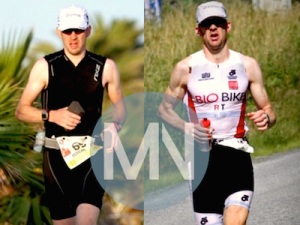Duncs Shea-Simonds – Ironman Triathlete
"I am setting PB's at the age of 39; when common thinking says it's impossible- this is nothing short of miraculous!"

"So with the start of 2012 and my last Triathlon competition out of the way I thought now is the perfect time to take stock of the last 12 months.
As many of you have come to realise – Nutrition has featured very heavily in my blog this year and to that end – I'd like to review my 2011 season within the context of my work with the leading performance nutritionists at Mac-Nutrition.
I had a busy year of Ironman racing planned and wanted to leave no stone unturned in my quest for a performance to be proud of which, to date, had eluded me.
My relationship with Mac-Nutrition started with a review of my goals for the year and a frank assessment of my diet by way of meticulous food diary.
Goals for the year included increased strength and lean muscle mass, increased fuelling efficiency for longer distance triathlons and improved general health and powers of recovery to facilitate the consistent, progressive, training so critical to Ironman success.
If I'm totally honest, I was more than a little skeptical and wondered how M-N Team might change the way I ate. I'd read a few books, understood the food pyramid, I thought my diet was already pretty healthy.
“What could Mac-Nutrition really do for me?”
As an endurance athlete I ate lots carbohydrate – and I mean LOTS. The triathlete staples of pasta, rice, potatoes, cereals, bread and sports drinks provided the foundation of my diet.
Food was fuel – simple as that. It replaced the 1000's of calories I burned in training. I wasn't really too concerned where those calories came from, providing I was getting enough. And carbs seemed to be the macro nutrient of choice within the athletic community.
I did make concessions to “healthy eating” though. I ate lots of fruit (more carbs), and I tried, where possible, to make what I thought were healthy choices including….
- Buying “Low Fat” products wherever possible
- Drinking Skimmed and Semi-Skimmed milk
- Limiting my intake of red meat to special occasions
- Cutting out visible fat wherever I saw it (trimming bacon etc)
- Using “Healthy” vegetable oils or grilling food where possible
- Limiting my intake of fatty foods including eggs and cheese – In that sense, I was a total “Carb Junky” and completely “Fat Phobic”.
It should be noted however that I was “doing ok” on my low fat, high carb regime. I was pretty skinny, and my race results were better than some, worse than others. And there lies the problem. Many athletes “do ok” on high carb diets but I was soon to learn that I was doing ok in spite of my high carb diet, not because of it!
Sure, I used to run out of gas on long training sessions but that was easily avoided by taking a good supply of carb drinks and gels.
I was never what you'd call a strength athlete but I put my lack of lean muscle mass down to genetics and blamed my parents and classic “Ectomorph” build. I just was one of those guys that couldn't build muscle.
I used to get sick, but all athletes do, when they are training hard right? We are always walking that fine line between being very fit and very ill.
Sometimes I'd struggle the day after hard sessions or double training days and I'd either “push through” with a sub-standard session or reluctantly take a few easy days.
I'd also get the occasional niggle that “all” athletes get from time to time and the odd week or two lost to a bug or cold.
What I would soon come to realise is that all these issues are not “par for the course” for endurance athletes. They don't “come with the trade”.
They are detrimental to athletic improvement and success.
And are all avoidable.
As I discovered, endurance athletes can be both very fit, very lean and very healthy.
So, my food diaries were reviewed, along with my body composition.
Interestingly, my total caloric intake tracked my expenditure pretty well. I seemed to be lucky in this sense and was able to subconsciously adjust my daily intake to match expenditure. I guess I was just well in tune with my body and had a healthy relationship with food. Maybe I could thank my parents for that one!
This was no real surprise as I'd hovered around the 73-75kg mark for as long as I could remember. I'd tried on occasion to drop a few kgs, thinking it may help my running. Reducing calories just seemed to make me ill and prone to excessive fatigue and injury.
73kg therefore seemed “comfortable”, but I remained convinced that I could benefit from a 2 – 3kg weight loss, if it could be done without the associated health issues I'd experienced in the past.
What my food diary highlighted to the team at Mac-Nutrition was that my macro nutrient balance needed addressing. It was clearly very carb heavy and very low in fat – again, no big surprises there.
What was a surprise, was the advice that followed….
I had to lose my fat phobia and start actively including and ADDING fat to my meals. Carbs, on the other hand, would have to be reduced. Protein intake would be increased.
I had to start viewing food as a source of nutrition, not merely fuel. My diet would be based around nutrient dense, natural, real food. Carbs would play their part, most specifically post training, but my carb choices would move from high GI refined types to lower GI alternatives such as sweet potato and quinoa.
Within a few months, my body weight had dropped to 70kg for the first time in years yet I felt stronger and healthier than ever. Body fat percentage dropped to 6.8% and proved very straightforward to maintain at this level.
By increasing dietary fat and becoming less reliant on carbs I began to feel a real change in the way my body fueled during long training sessions and races. I felt better able to utilise my own fat stores for fuel and became much more comfortable heading out on long bike and run sessions without a steady stream of sports drinks, gels and bars! This metabolic shift is what would ultimately lead to my improvement over the half and full Ironman distance.
I feel my year has been a great success – most probably my best to date.
Some stand-out performances from my year include the following.
- Edale Skyline fell race – My highest ever finish, taking 40 minutes off my previous best time
- Inter-county Cross Country Championships – Gaining my first County vest for Leicestershire
- Mallory Park triathlon – 3rd Place in my first Triathlon test of the year
- Beaver Half Ironman Tri – 3rd Place coming from 6th off the bike
- Day in the Lakes Triathlon 2nd Place coming from 15th out of the water. Billed as one of the UK's toughest Half Ironman races
- Norseman Extreme Triathlon – Black T-Shirt winner with the fastest run split ever by a GB male. Billed as the Worlds Toughest Ironman Triathlon
- Guiding Blind Para Triathlete Haseeb Ahmad to a National Gold medal and a Silver Medal in the World Paratriathlon Championships in Beijing
- Ironman Barcelona – Finally breaking 10 hours (9:50) in hot, windy conditions, 8 weeks after the Norseman
I raced almost every weekend of the season and it's fair to say that it's been my most hectic and successful year to date. What's more, I stayed injury free and healthy throughout.
I did not miss a single days training through illness or injury.
Other points worth noting.
- The nature and volume of my training in 2011 did not differ significantly from other years. I followed a similar approach to other years.
- What did change was the consistency and quality of this training. I felt I was getting more from the training I was doing and my new dietary regime was allowing me to adapt and gain maximum benefit from the type of hard training that, in the past, would just break me down as the year progressed.
- To think I am now setting personal best performances at the age of 39 when common thinking says my best years should be well behind me is nothing short of miraculous.
- Mac-Nutrition has opened my eyes to the genuine power of performance nutrition.
Since working with the team at Mac-Nutrition I have truly embraced the power of real food, not only as an “ergogenic aid” to sports performance, but also as a means to safeguard my future health and resistance to illness. I now hold it as of (at least) equal importance to a well structured training plan.
I cannot put a price on the information I have learned working with the support team over this period. Mac-Nutrition has been the catalyst for a complete epiphany in the way I think about food and has started me on my own personal journey of nutritional discovery that I will continue for many fit, fast, years to come!"

Duncs Shea-Simonds, Leicestershire

